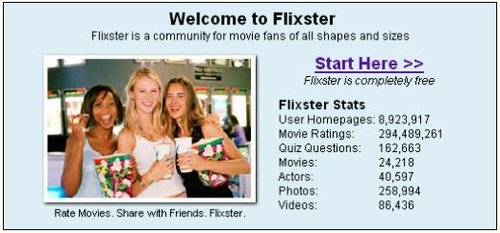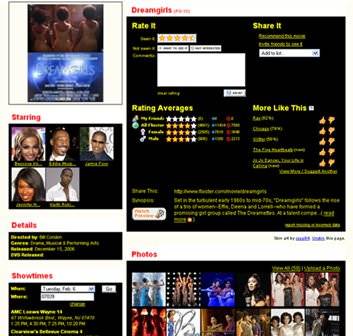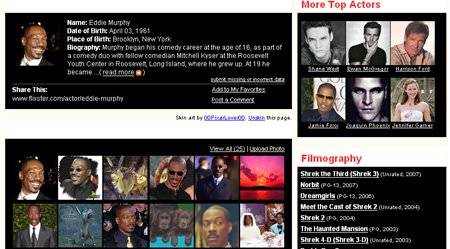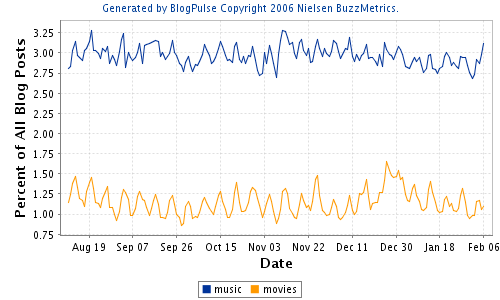Written by Alex Iskold and edited by Richard MacManus
Last week there was a post on TechCrunch entitled Flixster is
growing like weed, which described how a trendy new startup called Flixster has
seen phenomenal growth over the last few months. Flixster is a social network based around
movies. Why is it so popular? In this post we analyze Flixster’s features and determine
the reasons for its success so far. We end by looking more generally at the rise of
specialized social networks.
Overview

Flixster proudly states its user base in the homepage – the current figure is almost 9
million users. And we know these users are active, because on average each user has rated
more than 30 movies. Another interesting data point: the recent hit movie Dream
Girls has been rated by 4,600 Flixter users. The same movie has been rated 5,000
times on the popular ticketing site Fandango and
only 300 times on AOL Movies.
Flixster features
Probably the number one reason that Flixster is so appealing is its broad feature set.
Movie lovers get movies, actors, photos, news, reviews, ratings, previews, quizzes,
showtimes – and of course social networking. Flixster is really a one-stop shop for all
your movie needs. The features are slick and a lot of thought has been put into them. At
first glance, it also seems to have the same chaotic feel that MySpace has. But a closer
look reveals structure and an ambition for completeness.

At the very heart of Flixster are the movie profiles. The sheer amount of
information about a movie crammed into one page is mind boggling. Yet the movie profiles,
just like the other pages, are not overwhelming. The movie cover, ratings, reviews and
similar movies occupy the top portion of the movie profile. The photos of the actors, as
well as photos from the movie and the preview, are listed below. For American users, if
you enter your zip code in your profile, you will get a section with the movie showtimes
in your area. You can also see all the fans of the movie and, of course, read the
reviews.
But wait, there’s more features!
For each movie you can read relevant news. This is a subset of the main news tab,
which displays links to news about the movie, actors, director, etc.
Another interesting feature is that each movie can have many skins. The skins are
created by Flixster users and are available to be applied to the movie by other users.
This is a fun and playful way for users to express their attitudes towards a
movie.
The next major tab in Flixster is ‘Actors’. Each actor has a page that packs an
impressive amount of information, including bio, pictures, clips, news, filmography and
of course fans.

The Movies and Actors tabs are followed by News, Personal Profile, Friends, Browse
Users and Fun Stuff tabs. Each of these are interesting and useful. Personally, I found
the never ending quiz addictive (there was a warning that it is!). Another interesting
aspect was that the users themselves can make up quiz questions.
The final noteworthy feature is matching people based on movie preferences. It is
fairly obvious to do, but Flixster does it well – by giving you an option to meet people
who generally like similar movies, or who share the same favorite movie or actor.
Is Flixster an accident or pattern?
From analyzing Flixster’s features, we see that it has excelled in building a niche
social network for movies. Given the stunning success of MySpace, one can’t help but
wonder whether MySpace will do what Flixster does – or even can Flixster become another
MySpace? These are not easy questions to answer. To approach them, let’s revisit the
ingredients that made MySpace so popular.
Firstly, MySpace gave everyone a simple address online:
http://www.myspace.com/johndoe. Instead of complex URLs, people could just head
over to MySpace.com slash user name. Then there is that fairly loose structure of
profiles, that overall creates an impression of total havoc on the site – but
crucially it also allows users to express their creativity. Then there is music. Profiles
of musicians played a critical role in the rise of MySpace.
What Flixster has that MySpace does not is structure and a really great
understanding of the semantics of movies. Put simply, MySpace right now does not
have the infrastructure to do for movies what Flixster does. MySpace has basic Film pages,
but they are not even close in quality to Flixster. Of course MySpace could develop it,
but it would be at odds with what MySpace is today. So right now, it seems difficult to
see MySpace evolving to include a range of specialized networks like movies.
What about the other way around, can Flixster reach the size of MySpace? It’s unlikely,
given that only a fraction of people who hang out on MySpace would be so in love with
movies to bother to join Flixster. Movies are a big trend, but it is not even half as big
as music:

But even if Flixster is not going to be as big as MySpace, it can get pretty big as the
largest social network centered on movies. The fact is that Flixster is delivering a value
a level above a generic social network – and that value is market specialization. And as
Jawad Shuaib discussed in his great post on
Read/WriteWeb earlier this week, specialization and niche are now the
keys to startup survival.
The rise of specialized social networks
Flixster is far from being alone. LibraryThing is a social community focused on
Books, which (among other great things) has a fantastic book recommendation system based
on tagging – the technique that we discussed in this
post about Amazon. Last.fm is a much talked about social
network centered on Music. And actually, LinkedIn
is not a general social network, it is a social network for business networking. Other
examples of specialized networks include Jawad’s Shuzak for geeks and the recently launched Change.org (R/WW write-up here).
Conclusion
Looking at the landscape of today’s social networks, we see a dominant generic network
– MySpace. While the battle for the #1 spot is not completely over (right Facebook?), at
least for now MySpace is the king. However, MySpace and other generic networks right now
are not focused on including specialized categories like movies and books. This creates a
gap and an opportunity for site like Flixster, that focuses heavily on creating the best
experience around a particular social category.
So a few years from now, perhaps we will still see a few top generic social networks
and many specialized ones. Of course only time will tell. What do you think will
happen?










